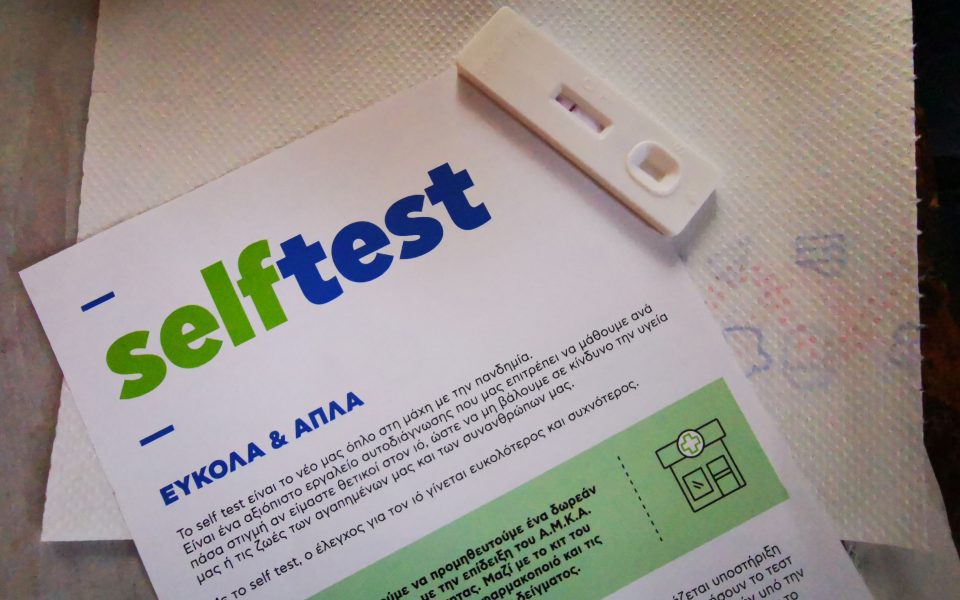Covid protection hurts the environment
Experts propose safe disposal system for hazardous used test kits, warn of plastic waste

Millions of self-tests are carried out for Covid-19 in Greece every week and questions abound not just about their results and how these are reported, but also about what happens to the discarded kits, elements of which need to be handled carefully. At the same time, the pandemic has unleashed a wave of plastic trash on Greece and the world, raising all sorts of new waste management challenges.
Self-testing kits are part of Greeks’ day-to-day lives right now, a key element of the campaign to restart economic and social activities, but their instructions do not include information on how to dispose of them safely after they’ve been used. Apart from their plastic wrappers and components, these kits also contain octyl/nonylphenol ethoxylates, which are defined as substances of very high concern (SVHC).
“It is a substance that is considered an endocrine disruptor, meaning that it can cause serious problems in the immune system’s operation. Even in very small quantities, it can have a negative effect. What’s more, it is not biodegradable, but accumulative instead, which is why such chemicals are also a threat to the environment,” explains Petros Samaras, a professor of science and food technology at the International Hellenic University (IHU).
“And even though the quantity of the test liquid in the kits is very small, the large number of tests calls for caution so that they don’t impact the environment,” he stresses.
To be fair, the instructions enclosed in the testing kits do warn – in very fine print – that they need to be treated like dangerous biological waste when disposed of, though given how fine print is generally treated, the majority of users will most likely follow the instructions on the official government website, self-testing.gov.gr. This says that the kits can be disposed of like regular trash, except if the test is positive, in which case the discarded kit must be “well secured in two bags.” It is noted that the kits should not be disposed of in the blue recycling bins or flushed down the toilet.
What can be done? Samaras and Aristotle University of Thessaloniki environmental engineer Yannis N. Krestenitis recently presented a proposal in which they argue that self-testing kits must be disposed of in the same way as unused or expired medicines, which are returned to pharmacies, placed in a special green locker and then sent for incineration. They warn that any other disposal method poses a public health and environment hazard.
To begin with, Samaras adds, the public should be better informed about how to handle the detritus of self-testing. Instructions, he says, “need to be clearly written in the pamphlet and included in the [self-testing.gov.gr instruction] video, so that people are more careful. This should also be the case for positive samples, which would be best kept in a safe place for 72 hours [before disposal] so they cannot spread the virus.”
The scourge of plastic
Apart from all its other ills, the coronavirus crisis has also brought a plastic waste scourge. “The amount of plastic produced and used because of the pandemic is truly frightening and we don’t even have a picture of the true scale. In Wuhan alone, hospitals disposed of 260 tons of single-use plastic every day during the lockdown. In February 2020, China produced 116 million masks a day compared with 10 million before the coronavirus. It is estimated that by the end of 2021, more than 100 billion masks and as many single-use gloves will have been made,” chemical engineer Antonis Mavropoulos, a member of the United Nations Environment Program (UNEP) and former president of the International Solid Waste Association (ISWA), tells Kathimerini.
“Covid-19 will go away at some point, but the plastic will be here forever. It’s not easy to grasp the sheer volume, because the individual items we use are usually quite small, but the quantities are massive. Overall, it has been estimated that 1.5 million tons of waste is produced every day from single-use plastics connected to the management of the pandemic,” says Mavropoulos.
Despite the ongoing global conversation about reducing the use of plastic, the global plastic packaging market is expected to reach 1.02 billion dollars this year from $900 million in 2019, with an annual rise of 5.5% through 2025. “Half of this increase is attributed to the pandemic,” says Mavropoulos. “It’s not just the widespread use of plastic in healthcare – from face masks and shields, suits and shoe covers, to all sorts of vials. The use of plastic has also increased in many other areas: from single-use cutlery and plates in the food service sector to online shopping outlets.”





